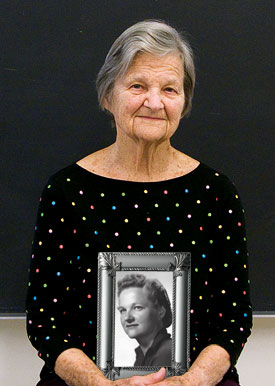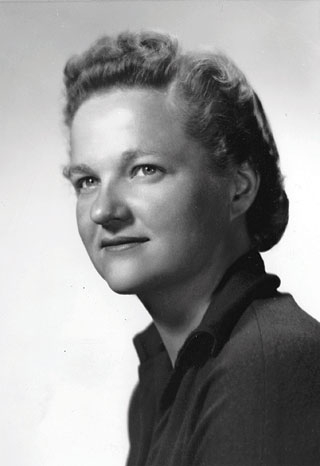Alma Mater
Elizabeth Adams Daniels ’41 has been a member of the Vassar community for almost half of the college’s history and has filled almost every conceivable role—student, professor, administrator, parent of a student, and historian.

Elizabeth Adams Daniels graduated in 1941 (second in her class), was appointed instructor of English in 1948, rose through the academic ranks, was named to the Helen D. Lockwood Chair, and taught generations of Vassar students. She served as dean of freshmen, dean of studies, acting dean of the faculty, and twice-chair of the English Department, served on or chaired virtually every college committee, including the Committee on Alternatives (or, as she calls it, the what-to-do-if-we-stay-in-Poughkeepsie committee), which ushered in coeducation. In 1985, the year she retired from teaching, she was appointed Vassar historian and promptly set about preserving, celebrating, and sharing the history of the college. One of her recent endeavors as historian is the online Vassar Encyclopedia project, which she directs. Here, she shares a little of her own story.
I grew up in Westport, Connecticut, and went to the public schools until the 10th grade, when my mother died. I had two siblings who were already through college by that time. Since I was the only person at home, my father decided to take an apartment in New York, and I ended up going to a private school.
It was a bad time for me, because I was still grieving for my mother and I was sort of out of it. But I went to Saint Agatha’s, which was a very good school, and it was the influence of my English teacher that headed me toward Vassar.
My father drove me up in September of 1937. On the way up, he told me that he was ill and undergoing tests. He also talked to me about doing myself proud, and doing my family proud, and that kind of thing, so I proceeded to do it.
My father died early in February my sophomore year. It was hard losing both parents within the space of four years, but if it had to happen, Vassar was a very good place to be. I was getting to be known on campus by then. I was a good student. And I found some alternate parents on the Vassar faculty. The very formidable Helen Lockwood ’12 had been my freshman English teacher. I remember going to convocation at nine o’clock in the morning before my first class freshman year. And the speaker was Lockwood, who raised the question, “What is man?” Very ambitious, mind-boggling. Then I went to my English class in Rocky at ten o’clock and discovered that Lockwood was my English teacher, at which point she said something like, “What is man?”—a question that we were supposed to attack the first moment of the class. She had us reading Plato right off the bat. And what she did in the way of assignments was to make us tackle some large philosophical question, like, where do you stand on the subject of God? Or, what is truth? So it didn’t seem like an English class.
In my sophomore year, I had as my adviser a woman named Anna Kitchel, who was a Victorian specialist. And between those two—who by the way did not like each other, but they both liked me—I experienced a lot of kindness. They knew about my problem and they paid attention to it.
It was an era when we didn’t have a counseling service. It was your faculty adviser who paid some extra attention to you when necessary, and that’s what Kitchel did. She had adopted Mary McCarthy ’33 also. So I heard steadily about Mary from the moment I hit her office. Kitchel would drive me around—we’d go out and look at the scenery on Saturday afternoons, things like that.
That’s the real reason I can call Vassar my alma mater. It was a fostering mother to me.

Elizabeth Adams Daniels ’41 will celebrate her 70th reunion this year. With more than 100 living members of their class, she and her classmates aim to break the record for 70th reunion attendance.
